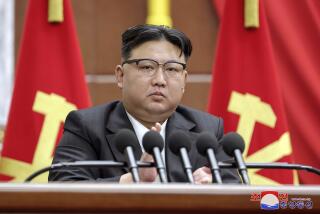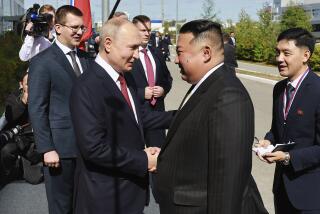U.S. Officials Weigh N. Korean Sanctions : Nuclear arms: North’s rapid removal of fuel rods focuses attention on possible U.N. curbs.
- Share via
WASHINGTON — President Clinton and his top national security officials met Tuesday to consider the potentially volatile question of whether to seek economic sanctions against North Korea--a move that Pyongyang has warned would be regarded as an act of war.
Although no final decisions were expected Tuesday, officials said Clinton wanted a consensus for any future actions by tonight, when he is scheduled to leave for Europe to help celebrate the 50th anniversary of D-day.
The flurry of activity came amid growing fears that North Korea may be removing spent fuel rods from its reactor so rapidly that it is on the verge of destroying U.N. inspectors’ ability to determine if reprocessed spent fuel has been diverted to make nuclear weapons.
The Administration has warned that it considers the ability of the U.N. inspectors to trace the history of North Korea’s nuclear program a crucial issue in the dispute.
The situation has been intensifying for days. In a last-ditch effort to avert a crisis, the U.N. Security Council on Monday urged North Korea to preserve all existing evidence of possible diversions of nuclear fuel.
The U.N.-affiliated International Atomic Energy Agency, which conducts the nuclear inspections, is expected to issue a report this week declaring whether North Korea has destroyed the agency’s ability to tell if Pyongyang has started the process of making nuclear weapons.
U.S. officials say that if the IAEA reports its efforts have been blocked, there is little doubt the Security Council will begin considering sanctions. The question then would be how broad the measures should be and how rapidly they should be imposed.
South Korea said Tuesday that North Korea already has removed more than 4,800 of 8,000 spent fuel rods in the reactor at Yongbyon--a far more rapid pace than Western analysts had expected. Officials say that at this rate, it could be only days before the evidence is destroyed.
The Administration continued to express alarm publicly. “We’re very concerned about the situation,” White House Press Secretary Dee Dee Myers told reporters. But she said Washington still hopes for a diplomatic solution.
A major problem facing the Administration is uncertainty whether China, which supported Monday’s U.N. appeal, would go along with any move to impose formal sanctions. China wants Washington to include negotiations about nuclear issues in broader U.S.-North Korean talks.
Pentagon officials said Tuesday that any decision to push for sanctions almost certainly would be accompanied by a step-up in the alert status of U.S. military forces in the region. North Korea repeatedly has warned that imposition of sanctions would be regarded as an act of war.
Defense Secretary William J. Perry has sent Patriot missiles to South Korea to strengthen allied defenses there and has ordered extra supplies of aircraft parts and ammunition in case the North launches a retaliatory attack.
In Vienna, North Korean officials continued to rebuff IAEA demands that inspectors be permitted to test the rods that have been removed. Yun Ho Jin, Pyongyang’s representative to the agency, said his government would not alter its policies any time soon, but he said that it would set aside 40 of the spent fuel rods for possible inspection by the IAEA later. Analysts said the move would be useless.
Intelligence reports from Japan also have suggested that North Korea may be preparing to test a new medium-range missile over the Sea of Japan--a step that could further intensify its confrontation with the West.
Myers said Tuesday that Clinton had spoken by telephone late Monday with South Korean President Kim Young Sam and the two had reaffirmed their support for Monday’s Security Council statement.
More to Read
Sign up for Essential California
The most important California stories and recommendations in your inbox every morning.
You may occasionally receive promotional content from the Los Angeles Times.













